
The median salary of an academic engineer increased by 2.4 percent from the previous year, according to a recent labour market survey by Academic Engineers and Architects in Finland TEK.
Salary progression was positive for those with other degrees as well. The biggest increase this time was in the median salary of those with a Master’s degree in STEM subjects – it was up 4.3 percent.
However, in smaller respondent groups – such as those with a Master’s degree – there is much more uncertainty in the results, and annual fluctuations are not uncommon.
According to the labour market survey, the median monthly salary of an academic engineer in permanent employment was 5,732 euros and their average salary was 6,202 euros as of October 2024. The corresponding salary figures for academic engineers who graduated in 2024 were 3,900 and 4,055 euros.
According to Statistics Finland, the annual change in consumer prices, or inflation, was 1.1 percent as of October, meaning that salaries increased more than consumer prices over the year. Real salaries, however, have fallen in the previous two years.
Median salary in the university sector remains below 5,000 euros
Many variables affect salary levels, such as one’s position in the company and the sector the employer operates in. Length of work experience also has an impact, as shown in the salary graphs below.

By sector, the highest median salaries were found in the finance and insurance, trade and construction sectors. Median salaries above 6,000 euros were also found in the telecommunications, forestry, electronics, auditing and management consulting sectors.
The largest sectors employing TEK members – namely metal and engineering, design and IT service – weren’t among the highest paying sectors.
”It’s perhaps worth noting that the highest paying sectors employ a relatively small number of TEK members. This also means that these highest paying sectors vary from year to year. The big picture, however, is relatively stable," says TEK’s Salary Researcher Tuunia Keränen, who conducted the labour market survey.
The lowest median salaries were found in the municipal, design and university sectors. In the university sector, the median salary of respondents was below 5,000 euros.
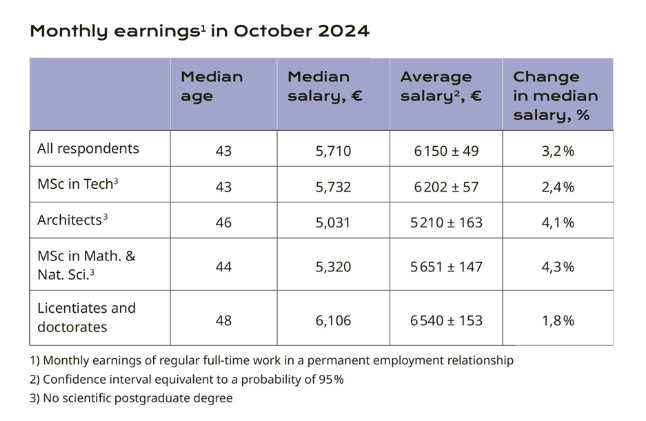
A general increase is still the most common reason for a raise
Of the respondents who worked full-time, 80 percent estimated that their salary had increased from the previous year. 12 percent estimated that their salary had remained the same, and 3 percent reported that their salary had decreased.
The share of those who received a raise was slightly lower compared to the previous year, when 85 percent of respondents estimated that their salary had increased.
A general increase was by far the most common reason for a salary increase. 72 percent of respondents who received a salary increase said that the reason was a general increase based on a collective agreement, which is the same for everyone.
17 percent of those who received a salary increase said the raise was decided by the employer on the basis of a collective agreement as a so-called instalment distribution.
22 percent of respondents who had received a salary increase received one based on their personal performance, which is also called a merit increase.
10 percent said they had received a raise due to a new position with the same employer, and 8 percent had received a salary increase after changing jobs.
“This year, once again, it looks like salaries will increase only by what the labour union has agreed with the employers in collective agreements. Inflation is rampant every year and prices will rise. Relying solely on the goodwill of the employer would mean that without collective agreements, the situation would be much worse for the majority of academic engineers,” says Teemu Hankamäki, Labour Market Director at TEK.
Merit increases lower compared to previous year
On average, salaries increase as workers gain more knowledge and experience. As they become more experienced, employees often also move to more demanding jobs, which thus increases their salary.
Employees’ positions describe how demanding the job is in general terms. On average, the more demanding the job, the higher the salary.
For example, the median salary in demanding expert tasks was 5,064 euros per month, in upper middle management 6,654 euros per month and in management 8,400 euros per month.
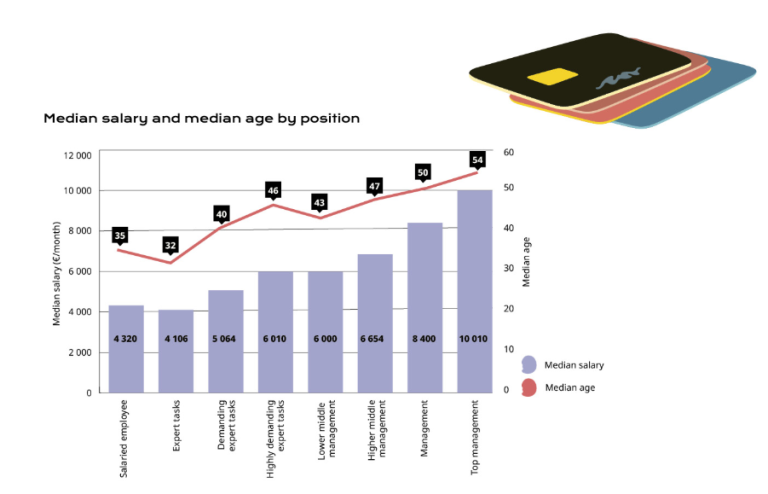
Many have also received a salary increase based on their personal performance, which is called a merit increase. The monthly salary of those who received a merit increase grew by an average of 300 euros as measured by the median.
A new position or work task with the same employer resulted in an average increase of 528 euros and changing employers increased monthly salary by an average of 700 euros. These increases were lower compared to the previous year.
In 2024, salary increases of around 2.5 percent were paid to employees in several sectors, some of which were part of a general increase and some of which were distributed at the discretion of the employer. However, different kinds of agreements on salary increases may also have been made regionally.
Performance bonus averages 8 percent
54 percent of respondents who were full-time employees reported that they had a performance-related pay system. This was slightly less than in previous years. Performance-related pay is most frequently used in the industrial sector where over 70 percent of respondents said they were included in such a system.
When viewed by position, performance-related pay was more common in management roles compared to expert tasks. Slightly less than 70 percent of respondents working in management or middle management positions and approximately half of respondents working in expert positions were included in a performance-related pay system.
Of those included in such a system, 80 percent had received a performance bonus over the last 12 months. This share remained virtually unchanged compared to the 2023 labour market survey.
The average size of a performance bonus had also remained the same compared to the previous year with a median of 8 percent of annual earnings.
The median share of a performance bonus was 10 percent in management roles, 8 percent in middle management and 7 percent in expert roles.

Salary graph markings in the figures below
n = number of respondents
10 % fractile = a salary of which 10 % of respondents earn less.
25 % fractile = a salary of which 25 % of respondents earn less.
Median = the middle point of all salaries in order of magnitude. There is an equal number of salaries above and below the median.
75 % fractile = a salary of which 25 % of respondents earn more.
90 % fractile = a salary of which 10 % of respondents earn more.
The salary concept used in the Labour Market Survey is total gross monthly earnings. It includes the basic salary, the taxable value of fringe benefits (e.g. phone benefit of €20/month) and monthly payments such as sales commissions. It does not include overtime pay, holiday bonuses, annual bonuses or performance bonuses that are paid less frequently or over a period of more than one month.
The salary graphs include salaries from both permanent and fixed-term employment relationships. The graduation year refers to the year of completion for those with a postgraduate degree, but for those with a graduate degree (MSc, architect) it refers to the year of graduation.
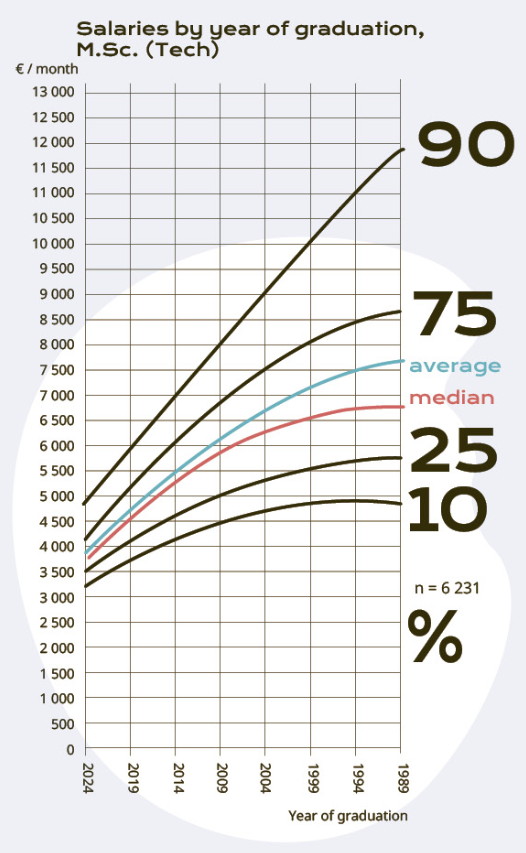
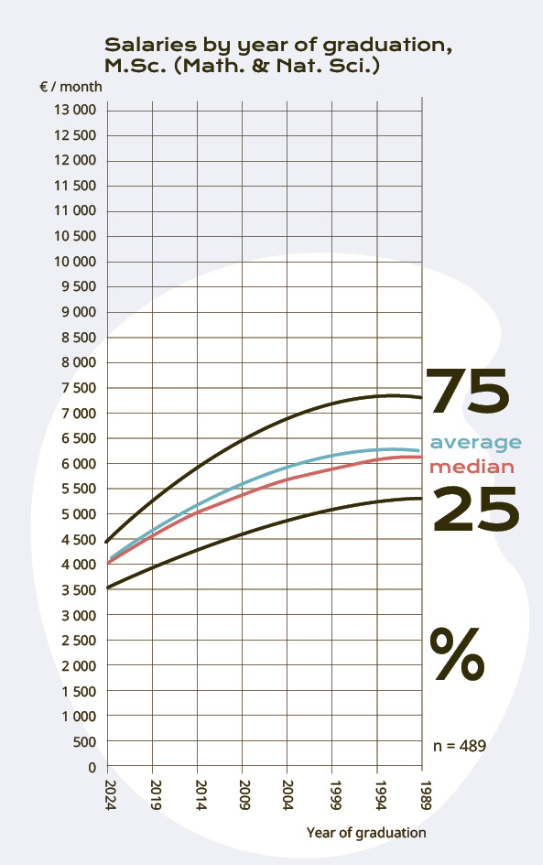
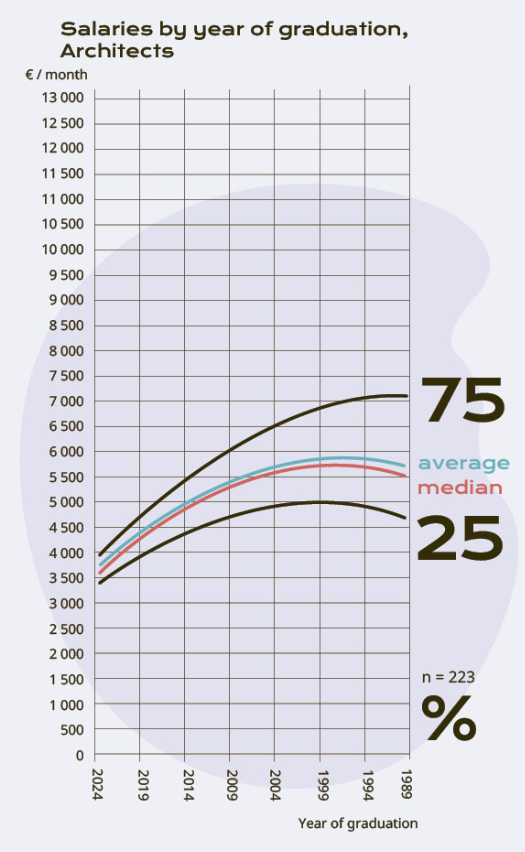
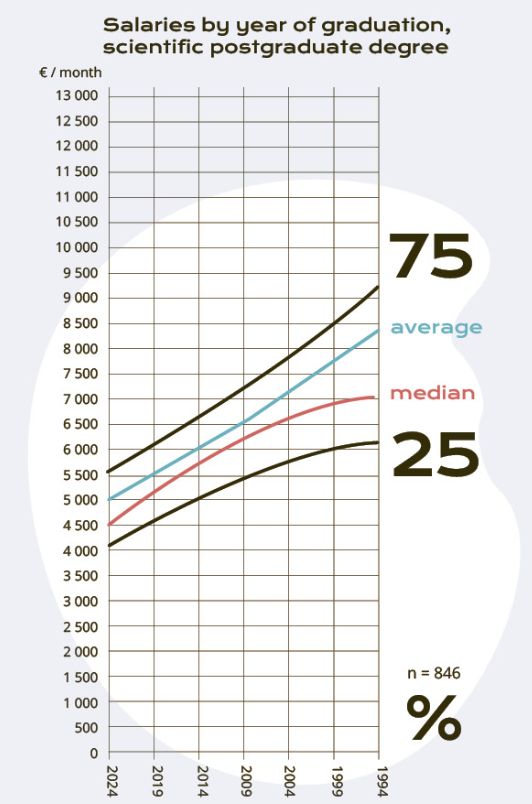
This is how the survey was conducted
Data collection for the labour market survey was carried out in October–November 2024, and the target group consisted of TEK members in the labour market. We received approximately 9,400 responses, and the response rate was about 21 percent. Both the number of responses and the response rate were roughly the same as in the year before.
Of the respondents, 73 percent were men and 27 percent women. The median age was 43 years. The most common degree completed was that of an academic engineer (Master of Science) which was held by 76 percent of respondents. The vast majority of respondents, 88 percent, were employed full-time. 4.6 percent of respondents were unemployed or laid off and 1.4 percent were full-time entrepreneurs. The percentage of respondents who were unemployed or laid off was higher than in the previous year, when it was 3 percent.
Of the respondents working full-time, 85 percent worked in the private sector, and about half of them worked in industry. 95 percent of respondents were employed on a permanent basis.
A warm thank you once again to everyone who participated in the survey!